Module 3 Making plans.Unit 3 Language in use教学课件(共37张PPT)
文档属性
| 名称 | Module 3 Making plans.Unit 3 Language in use教学课件(共37张PPT) |  | |
| 格式 | ppt | ||
| 文件大小 | 2.0MB | ||
| 资源类型 | 教案 | ||
| 版本资源 | 外研版 | ||
| 科目 | 英语 | ||
| 更新时间 | 2022-07-06 11:26:04 | ||
图片预览

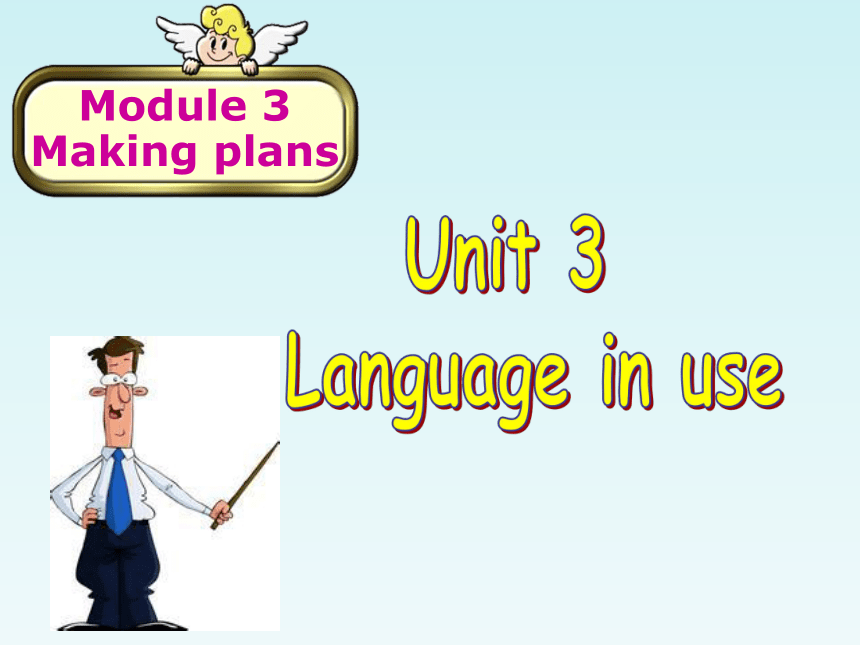
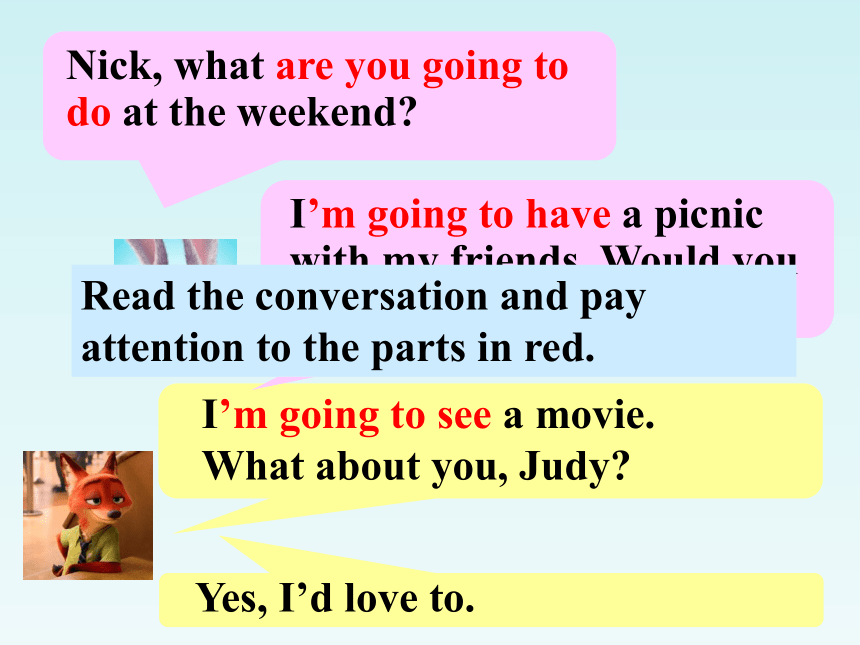
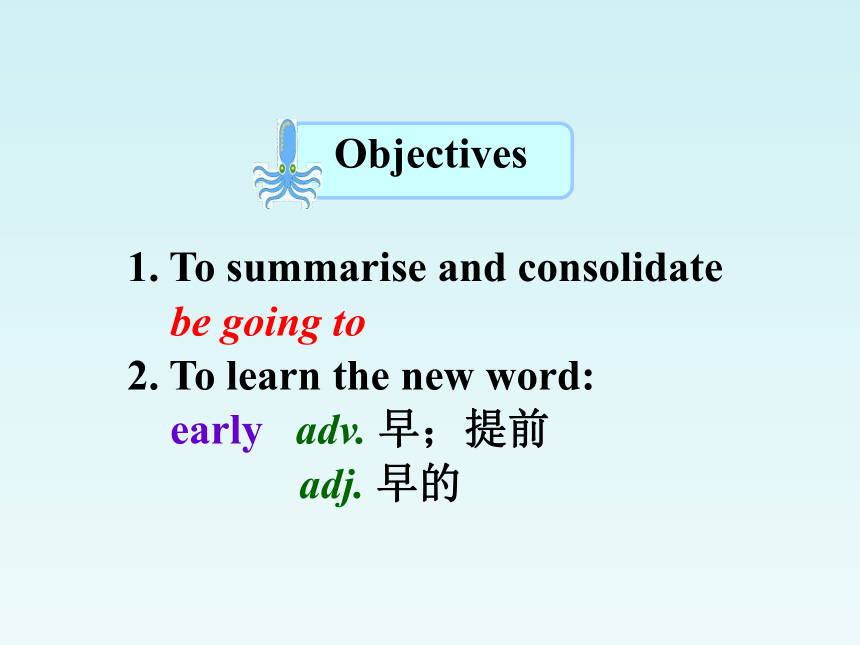
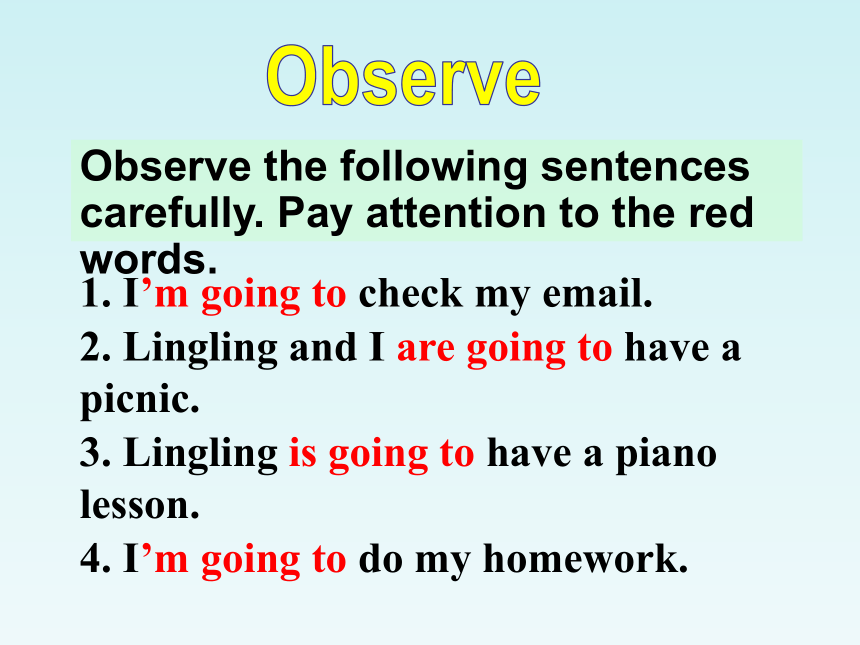
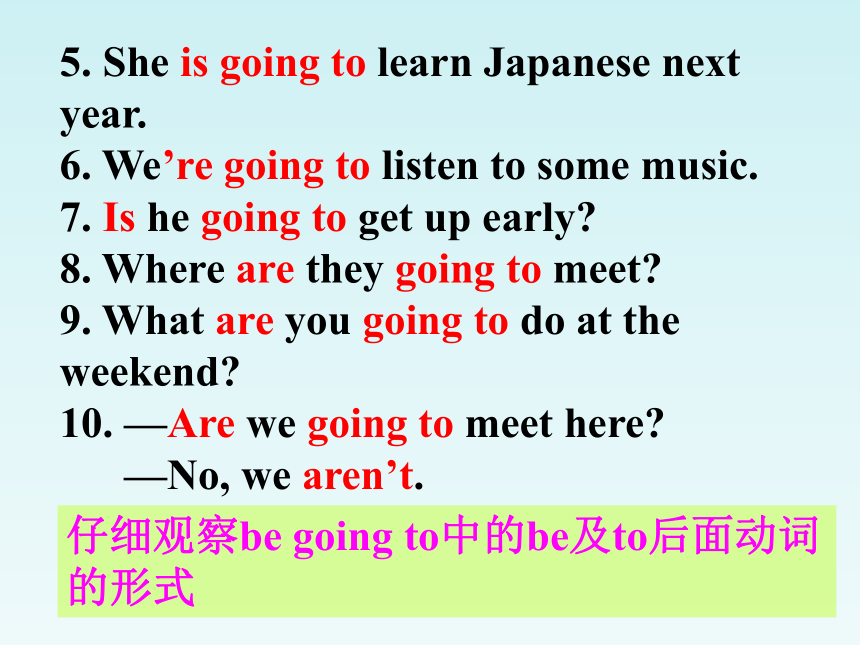
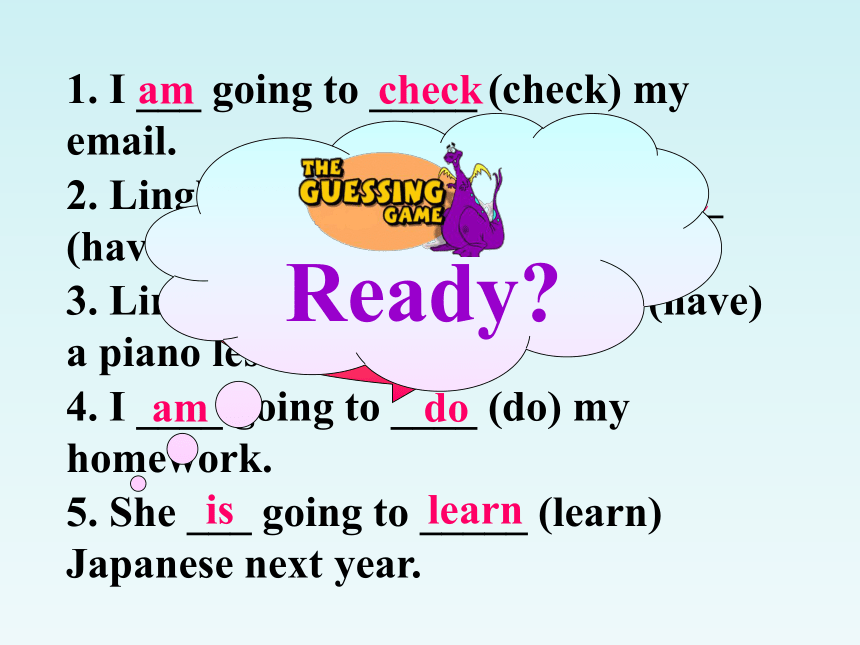


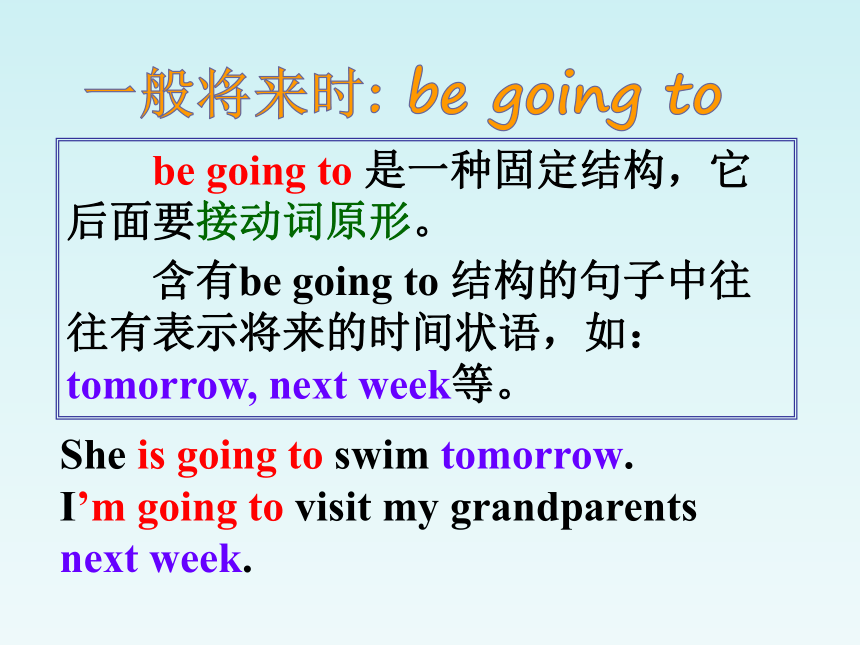
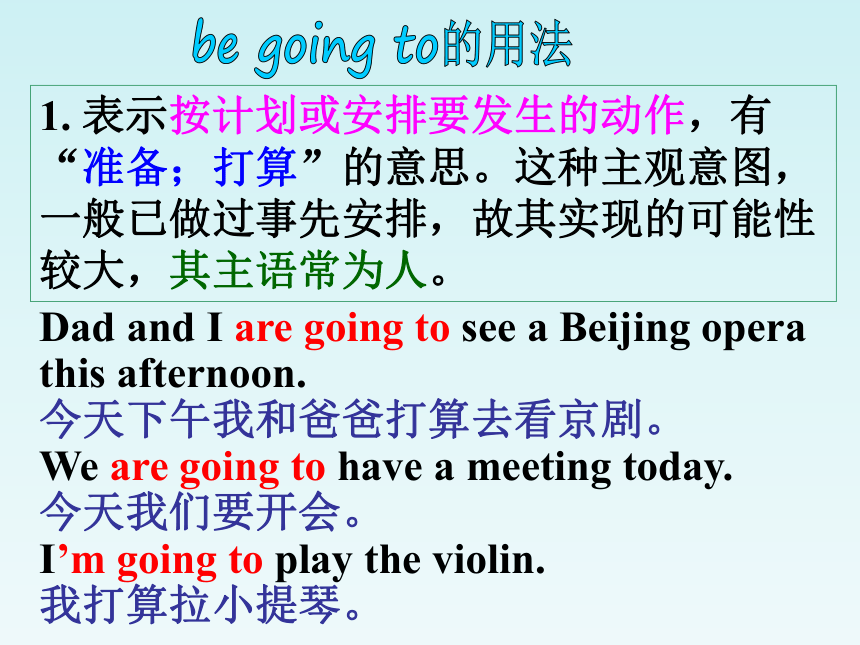
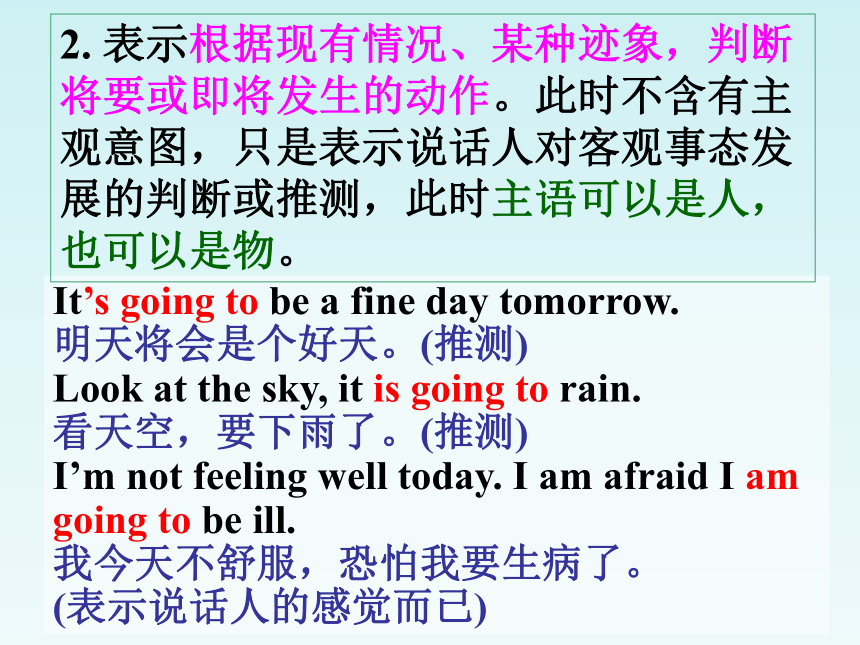
文档简介
(共37张PPT)
外研 七年级下
Module 3
Making plans
I’m going to see a movie. What about you, Judy
I’m going to have a picnic with my friends. Would you like to join us
Nick, what are you going to do at the weekend
Yes, I’d love to.
Read the conversation and pay attention to the parts in red.
1. To summarise and consolidate
be going to
2. To learn the new word:
early adv. 早;提前
adj. 早的
Objectives
Observe the following sentences carefully. Pay attention to the red words.
1. I’m going to check my email.
2. Lingling and I are going to have a picnic.
3. Lingling is going to have a piano lesson.
4. I’m going to do my homework.
5. She is going to learn Japanese next year.
6. We’re going to listen to some music.
7. Is he going to get up early
8. Where are they going to meet
9. What are you going to do at the weekend
10. —Are we going to meet here
—No, we aren’t.
仔细观察be going to中的be及to后面动词的形式
1. I ___ going to _____ (check) my email.
2. Lingling and I ___ going to _____ (have) a picnic.
3. Lingling ____ going to _____ (have) a piano lesson.
4. I ____ going to ____ (do) my homework.
5. She ___ going to _____ (learn) Japanese next year.
am check
are have
is have
am do
is learn
go
Ready
6. We ___ going to _____ (listen) to some music.
7. ___ he going to ____ (get) up early
8. Where ____ they going to ____ (meet)
9. What ____ you going to ____ (do) at the weekend
10. —____ we going to _____ (meet)
here
—No, we _______.
are listen
Is get
are meet
are do
Are meet
aren’t
be going to 是一种固定结构,它后面要接动词原形。
含有be going to 结构的句子中往往有表示将来的时间状语,如:tomorrow, next week等。
She is going to swim tomorrow.
I’m going to visit my grandparents next week.
Dad and I are going to see a Beijing opera this afternoon.
今天下午我和爸爸打算去看京剧。
We are going to have a meeting today.
今天我们要开会。
I’m going to play the violin.
我打算拉小提琴。
1. 表示按计划或安排要发生的动作,有“准备;打算”的意思。这种主观意图,一般已做过事先安排,故其实现的可能性较大,其主语常为人。
It’s going to be a fine day tomorrow.
明天将会是个好天。(推测)
Look at the sky, it is going to rain.
看天空,要下雨了。(推测)
I’m not feeling well today. I am afraid I am going to be ill.
我今天不舒服,恐怕我要生病了。
(表示说话人的感觉而已)
2. 表示根据现有情况、某种迹象,判断将要或即将发生的动作。此时不含有主观意图,只是表示说话人对客观事态发展的判断或推测,此时主语可以是人,也可以是物。
1. 肯定句:
主语+be (am, is, are) going to …
I am going to buy something tomorrow morning.
明天早上我要去买些东西。
She is going to see Mr. Wang this afternoon.
她打算今天下午去看望王先生。
2. 否定句:
主语+be (am, is, are) not going to …
3. 一般疑问句:
Be (am, is are) +主语+going to …
肯定答语:Yes, 主语+am/is/are.
否定答语:No, 主语+am not/isn’t/aren’t.
注意:I am…在改为一般疑问句时常常改为“Are you … ”
They are going to see the car factory next week. (肯定句)
They are not going to see the car factory next week. (否定句)
—Are they going to see the car factory
next week
—Yes, they are. /No, they aren’t.
(一般疑问句及其回答)
I’m going to New York soon.
→Who’s going to New York soon
My father is going to watch a race with me this afternoon.
→What is your father going to do with you this afternoon
1) 问人 Who…
2) 问干什么 What … do
4. be going to 的特殊疑问句:
Helen is going to visit her granddaughter in China next week.
→When is Helen going to visit her granddaughter in China
He is going to have his birthday party in his house.
→Where is he going to have his birthday party
3) 问什么时候 When…
4) 问什么地点 Where…
There is going to be a football match next Saturday in our school.
下周六我们学校将有一场足球比赛。
There be句型的be going to 结构为:There is / are going to be ...
表示将有某事发生。
(注意句型中going to后面的be不能改为have)
2. come, go, leave, arrive等表示位置移动的动词常用现在进行时表示将要发生的动作,它们很少与be going to 结构连用。
Miss Sun is coming tonight.
今晚孙小姐要来。
They are going to the park next Friday.
下星期五他们打算去公园。
3. “be going to +动词原形”结构与表示将来的时间状语是否连用,在意思上有所差别。如果其后有明确的时间状语,则表示该动作或状态发生的可能性较大;反之,则表示一种推测,表示未来可能发生的事情。
There is going to be a film in our school this evening.
今晚我们学校将有一场电影。(一定会发生)
Hurry up! We are going to be late.
快点!我们要迟到了。(仅表示一种推测)
be going to各句式中的变化:
肯定 否定 一般疑问 回答
I am going to… I am not going to… Am I going to… Yes, you are./ No, you aren’t.
You are going to… You are not going to… Are you going to…
Yes, I am (we are)./ No, I am not (we aren’t).
He/she is going to… He/she is not going to… Is he/ she going to… Yes, he/she is./ No, he/she isn’t.
肯定 否定 一般疑问 回答
It is going to… It is not going to… Is it going to… Yes, it is./ No, it isn’t.
We are going to… We are not going to… Are we going to…
Yes, you are./
No, you aren’t.
They are going to… They are not going to… Are they going to… Yes, they are./
No, they aren’t.
以下部分为课本练习,供老师在对答案时选择使用。
—What are you going to do on
Saturday morning
—On Saturday morning I’m going to …
Work in pairs. Look at the table. Ask and answer questions about weekend plans.
People you your parents
your friends
Activity have a picnic
listen to music
play computer games
take a walk
P18
1
Complete the sentences with the correct form of the words and expression from the box.
1. We are going to ______ a movie this weekend.
2. They are going to ______ football on Sunday.
3. Betty wants to go shopping. She’s going to ______ some clothes.
4. I’m going to ______ a piano lesson on Saturday morning.
see
buy get up go have make play see stay walk
play
buy
P18
2
have
5. Daming isn’t going to ______ in bed on Sunday morning. He’s going to ______ early.
6. Lingling wants to go for a walk. She’s going to ______ in the park.
7. Tony is going to ______ to a summer camp during the summer holiday. He’s going to ______ a lot of friends and have fun.
stay
get up
walk
go
make
buy get up go have make play see stay walk
1 check/you/going/are/to/email/your/
2 they/on/in/park/are/going/to/Sunday/
litter/ collect/the/
3 some/going/is/new/buy/Betty/to/clothes/
Put the words in the correct order to make questions.
Are you going to check your email
Are they going to collect litter in the park on Sunday
P18
3
Is Betty going to buy some new clothes
4 this/a/you/see/going/are/to/movie/evening/
5 computer/Tony/to/play/a/is/going/game/
Are you going to see a movie this evening
Is Tony going to play a computer game
Now complete the answers to the questions. Use short forms.
Yes, I ______.
Yes, they _____.
____, she isn’t.
No, we ______.
Yes, he _______.
am
are
No
aren’t
is
Talking about your weekend plans
Step 1: Work in groups of three. Talk
about what you’re going to do at
the weekend.
A: What are you going to do at the weekend
B: I’m going to … (to C) What about you
C: I’m going to …
Now write down your ideas.
Step 2: Make plans to do things
together with the others in your
group. Make a group diary for
next weekend.
Saturday morning Sunday morning
Saturday afternoon Sunday afternoon
Saturday evening Sunday evening
Step 3: Talk about your group diary
to the whole class.
On … we are going to …
On Saturday, we’re going to get up early and go swimming. In the afternoon, we’re going to go shopping and buy some new clothes. In the evening, we’re going to watch television. On Sunday morning, we’re going to the mountain for a walk. In the afternoon, we’re going to meet at Betty’s house. We’re going to have a homework club and do our homework together. In the evening, we’re going to play computer games.
Possible answer:
be going to,接“动原”,
表计划、准备或打算;
表可能,有必然,通过现象来判断。
be 的形式要注意,它要随着人称变;
否定句,很简单,not 加在 be 后面;
疑问句,需牢记,be 应提到主语前。
注: word 文档
点击此处链接
Quiz
Ⅰ. 用所给动词的适当形式填空。
1. Tomorrow we ______________ (buy) a present for Betty.
2. —What are you going to do at the
weekend
—I _______________ (see) a movie.
are going to buy
am going to see
Ⅱ. 句型转换,每空一词。
Tony is going to cook breakfast this
weekend. (改为否定句)
Tony _______ _______ to cook breakfast this weekend.
2. We are going to the sports hall.
(对划线部分提问)
_______ _______ you _______
isn’t going
Where are going
3. They are going to make ice cream. (改为一般疑问句,并作否定回答)
______ they _______ ______ make ice cream
No, _______ _______.
4. Lisa is going to send a postcard this afternoon. (对划线部分提问)
______ _______ Lisa _______ _______ _______ this afternoon
Are going to
they aren’t
What is going to do
1. Review the grammar we’ve learnt today.
2. Finish the exercises in Learning English.
外研 七年级下
Module 3
Making plans
I’m going to see a movie. What about you, Judy
I’m going to have a picnic with my friends. Would you like to join us
Nick, what are you going to do at the weekend
Yes, I’d love to.
Read the conversation and pay attention to the parts in red.
1. To summarise and consolidate
be going to
2. To learn the new word:
early adv. 早;提前
adj. 早的
Objectives
Observe the following sentences carefully. Pay attention to the red words.
1. I’m going to check my email.
2. Lingling and I are going to have a picnic.
3. Lingling is going to have a piano lesson.
4. I’m going to do my homework.
5. She is going to learn Japanese next year.
6. We’re going to listen to some music.
7. Is he going to get up early
8. Where are they going to meet
9. What are you going to do at the weekend
10. —Are we going to meet here
—No, we aren’t.
仔细观察be going to中的be及to后面动词的形式
1. I ___ going to _____ (check) my email.
2. Lingling and I ___ going to _____ (have) a picnic.
3. Lingling ____ going to _____ (have) a piano lesson.
4. I ____ going to ____ (do) my homework.
5. She ___ going to _____ (learn) Japanese next year.
am check
are have
is have
am do
is learn
go
Ready
6. We ___ going to _____ (listen) to some music.
7. ___ he going to ____ (get) up early
8. Where ____ they going to ____ (meet)
9. What ____ you going to ____ (do) at the weekend
10. —____ we going to _____ (meet)
here
—No, we _______.
are listen
Is get
are meet
are do
Are meet
aren’t
be going to 是一种固定结构,它后面要接动词原形。
含有be going to 结构的句子中往往有表示将来的时间状语,如:tomorrow, next week等。
She is going to swim tomorrow.
I’m going to visit my grandparents next week.
Dad and I are going to see a Beijing opera this afternoon.
今天下午我和爸爸打算去看京剧。
We are going to have a meeting today.
今天我们要开会。
I’m going to play the violin.
我打算拉小提琴。
1. 表示按计划或安排要发生的动作,有“准备;打算”的意思。这种主观意图,一般已做过事先安排,故其实现的可能性较大,其主语常为人。
It’s going to be a fine day tomorrow.
明天将会是个好天。(推测)
Look at the sky, it is going to rain.
看天空,要下雨了。(推测)
I’m not feeling well today. I am afraid I am going to be ill.
我今天不舒服,恐怕我要生病了。
(表示说话人的感觉而已)
2. 表示根据现有情况、某种迹象,判断将要或即将发生的动作。此时不含有主观意图,只是表示说话人对客观事态发展的判断或推测,此时主语可以是人,也可以是物。
1. 肯定句:
主语+be (am, is, are) going to …
I am going to buy something tomorrow morning.
明天早上我要去买些东西。
She is going to see Mr. Wang this afternoon.
她打算今天下午去看望王先生。
2. 否定句:
主语+be (am, is, are) not going to …
3. 一般疑问句:
Be (am, is are) +主语+going to …
肯定答语:Yes, 主语+am/is/are.
否定答语:No, 主语+am not/isn’t/aren’t.
注意:I am…在改为一般疑问句时常常改为“Are you … ”
They are going to see the car factory next week. (肯定句)
They are not going to see the car factory next week. (否定句)
—Are they going to see the car factory
next week
—Yes, they are. /No, they aren’t.
(一般疑问句及其回答)
I’m going to New York soon.
→Who’s going to New York soon
My father is going to watch a race with me this afternoon.
→What is your father going to do with you this afternoon
1) 问人 Who…
2) 问干什么 What … do
4. be going to 的特殊疑问句:
Helen is going to visit her granddaughter in China next week.
→When is Helen going to visit her granddaughter in China
He is going to have his birthday party in his house.
→Where is he going to have his birthday party
3) 问什么时候 When…
4) 问什么地点 Where…
There is going to be a football match next Saturday in our school.
下周六我们学校将有一场足球比赛。
There be句型的be going to 结构为:There is / are going to be ...
表示将有某事发生。
(注意句型中going to后面的be不能改为have)
2. come, go, leave, arrive等表示位置移动的动词常用现在进行时表示将要发生的动作,它们很少与be going to 结构连用。
Miss Sun is coming tonight.
今晚孙小姐要来。
They are going to the park next Friday.
下星期五他们打算去公园。
3. “be going to +动词原形”结构与表示将来的时间状语是否连用,在意思上有所差别。如果其后有明确的时间状语,则表示该动作或状态发生的可能性较大;反之,则表示一种推测,表示未来可能发生的事情。
There is going to be a film in our school this evening.
今晚我们学校将有一场电影。(一定会发生)
Hurry up! We are going to be late.
快点!我们要迟到了。(仅表示一种推测)
be going to各句式中的变化:
肯定 否定 一般疑问 回答
I am going to… I am not going to… Am I going to… Yes, you are./ No, you aren’t.
You are going to… You are not going to… Are you going to…
Yes, I am (we are)./ No, I am not (we aren’t).
He/she is going to… He/she is not going to… Is he/ she going to… Yes, he/she is./ No, he/she isn’t.
肯定 否定 一般疑问 回答
It is going to… It is not going to… Is it going to… Yes, it is./ No, it isn’t.
We are going to… We are not going to… Are we going to…
Yes, you are./
No, you aren’t.
They are going to… They are not going to… Are they going to… Yes, they are./
No, they aren’t.
以下部分为课本练习,供老师在对答案时选择使用。
—What are you going to do on
Saturday morning
—On Saturday morning I’m going to …
Work in pairs. Look at the table. Ask and answer questions about weekend plans.
People you your parents
your friends
Activity have a picnic
listen to music
play computer games
take a walk
P18
1
Complete the sentences with the correct form of the words and expression from the box.
1. We are going to ______ a movie this weekend.
2. They are going to ______ football on Sunday.
3. Betty wants to go shopping. She’s going to ______ some clothes.
4. I’m going to ______ a piano lesson on Saturday morning.
see
buy get up go have make play see stay walk
play
buy
P18
2
have
5. Daming isn’t going to ______ in bed on Sunday morning. He’s going to ______ early.
6. Lingling wants to go for a walk. She’s going to ______ in the park.
7. Tony is going to ______ to a summer camp during the summer holiday. He’s going to ______ a lot of friends and have fun.
stay
get up
walk
go
make
buy get up go have make play see stay walk
1 check/you/going/are/to/email/your/
2 they/on/in/park/are/going/to/Sunday/
litter/ collect/the/
3 some/going/is/new/buy/Betty/to/clothes/
Put the words in the correct order to make questions.
Are you going to check your email
Are they going to collect litter in the park on Sunday
P18
3
Is Betty going to buy some new clothes
4 this/a/you/see/going/are/to/movie/evening/
5 computer/Tony/to/play/a/is/going/game/
Are you going to see a movie this evening
Is Tony going to play a computer game
Now complete the answers to the questions. Use short forms.
Yes, I ______.
Yes, they _____.
____, she isn’t.
No, we ______.
Yes, he _______.
am
are
No
aren’t
is
Talking about your weekend plans
Step 1: Work in groups of three. Talk
about what you’re going to do at
the weekend.
A: What are you going to do at the weekend
B: I’m going to … (to C) What about you
C: I’m going to …
Now write down your ideas.
Step 2: Make plans to do things
together with the others in your
group. Make a group diary for
next weekend.
Saturday morning Sunday morning
Saturday afternoon Sunday afternoon
Saturday evening Sunday evening
Step 3: Talk about your group diary
to the whole class.
On … we are going to …
On Saturday, we’re going to get up early and go swimming. In the afternoon, we’re going to go shopping and buy some new clothes. In the evening, we’re going to watch television. On Sunday morning, we’re going to the mountain for a walk. In the afternoon, we’re going to meet at Betty’s house. We’re going to have a homework club and do our homework together. In the evening, we’re going to play computer games.
Possible answer:
be going to,接“动原”,
表计划、准备或打算;
表可能,有必然,通过现象来判断。
be 的形式要注意,它要随着人称变;
否定句,很简单,not 加在 be 后面;
疑问句,需牢记,be 应提到主语前。
注: word 文档
点击此处链接
Quiz
Ⅰ. 用所给动词的适当形式填空。
1. Tomorrow we ______________ (buy) a present for Betty.
2. —What are you going to do at the
weekend
—I _______________ (see) a movie.
are going to buy
am going to see
Ⅱ. 句型转换,每空一词。
Tony is going to cook breakfast this
weekend. (改为否定句)
Tony _______ _______ to cook breakfast this weekend.
2. We are going to the sports hall.
(对划线部分提问)
_______ _______ you _______
isn’t going
Where are going
3. They are going to make ice cream. (改为一般疑问句,并作否定回答)
______ they _______ ______ make ice cream
No, _______ _______.
4. Lisa is going to send a postcard this afternoon. (对划线部分提问)
______ _______ Lisa _______ _______ _______ this afternoon
Are going to
they aren’t
What is going to do
1. Review the grammar we’ve learnt today.
2. Finish the exercises in Learning English.
同课章节目录
- Module 1 Lost and found
- Unit 1 Whose bag is this?
- Unit 2 Are they yours?
- Unit 3 Language in use
- Module 2 What can you do ?
- Unit 1 I can play the piano
- Unit 2 I can run really fast
- Unit 3 Language in use
- Module 3 Making plans
- Unit 1 What are you going to do at the weekends?
- Unit 2 We're going to cheer the players.
- Unit 3 Language in use
- Module 4 Life in the future
- Unit 1 Everyone will study at home
- Unit 2 Every family will have a small plane.
- Unit 3 Language in use
- Module 5 Shopping
- Unit 1 What can I do for you?
- Unit 2 You can buy everything on the Internet
- Unit 3 Language in use
- Module 6 Around town
- Unit 1 Could you tell me how to get to the Nationa
- Unit 2 The London Eye is on your right.
- Unit 3 Language in use
- Revision module A
- Module 7 My past life
- Unit 1 I was born in a small village.
- Unit 2 I was born in Quincy.
- Unit 3 Language in use
- Module 8 Story time
- Unit 1 Once upon a time….
- Unit 2 Goldilocks hurried out of the house.
- Unit 3 Language in use
- Module 9 Life history
- Unit 1 He left school and began work at the age of
- Unit 2 He decided to be an actor.
- Unit 3 Language in use
- Module 10 A holiday journey
- Unit 1 What did you do?
- Unit 2 This morning we took a walk.
- Unit 3 Language in use
- Module 11 Body language
- Unit 1 They touch noses!
- Unit 2 Here are some ways to welcome them.
- Unit 3 Language in use
- Module 12 Western music
- Unit 1 It's so beautiful!
- Unit 2 Vienna is the centre of European classical
- Unit 3 Language in use
- Revision module B
